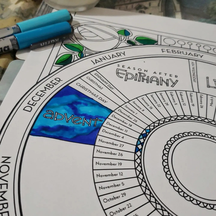 “LIKE A GREAT WATERWHEEL, THE LITURGICAL YEAR goes on relentlessly irrigating our souls, softening the ground of our hearts, nourishing the soil of our lives until the seed of the Word of God itself begins to grow in us, comes to fruit in us, ripens in us the spiritual journey of a lifetime.” —Joan Chittister The Liturgical Year: The Spiraling Adventure of the Spiritual Life As winter draws near, the nights grow longer and the hours of sunlight reach their shortest length of the year, we feel time in our bones. Often what we feel does not match the time on our clocks, when darkness falls so early. Surely it’s time to head to bed, we may think, only to check the clock and in shock discover it is only 6:30pm! (Or, maybe that’s just me!) We lean on our watches or phones to know the time, to help determine where we are in the movement of the day. The ancient Greeks had two words for time, chronos and kairos. Chronos is the kind of time we can quantify or measure, such as “The concert will last two hours” or “We averaged 65 mph on the way home.” Chronos is the time we see on our watches, the time we follow as we go to work or pick up the kids from school. We mark such time in minutes and hours, days, weeks, and years. The second word for time, kairos, concerns the meaningfulness of time, the potentiality of moments, expectancy of events. Kairos is the time of moments and breakthroughs, even interruptions. The church follows a calendar, with regular dates and festival times, which has points of connection with our chronos calendars. The new church year began on Sunday, November 27, with the first Sunday of Advent. There will be four Sundays of the season leading up to Christmas Day. Those dates are measurable, we can mark them on our personal calendars, keep track of those Sundays, note that Christmas Day is on a Sunday this year, too. Yet, the church’s liturgical calendar holds within it the possibilities of kairos time even as it marks the holy days of the Christian year. The church calendar invites us into an alternative plotline for our days, as it intentionally builds in times of preparation and repentance, with moments of remembrance and celebration. As Peter Leithart describes it, “the church calendar isn’t just a teaching device. It places us in the time of Jesus, and works the life and times of Jesus into us.” As we follow the rhythms of the liturgical year, we find a counterpoint to the secular calendar, a richer way of keeping time, walking alongside the stories of Jesus and diving deep into the ways of discipleship. This year we have liturgical calendar posters available for you. Take one home, put it up somewhere you can see it. Color the poster with your family. Explore the colors and the times of the church year and see how time changes and how keeping liturgical time may even change you.
0 Comments
Your comment will be posted after it is approved.
Leave a Reply. |
AuthorA native of Illinois, Rev. Nancy Gowler lived for 26 years in the Pacific Northwest. She joined the ministry of First Christian Church in Morehead, KY, in July of 2020. Archives
January 2023
Categories
All
|


 RSS Feed
RSS Feed
